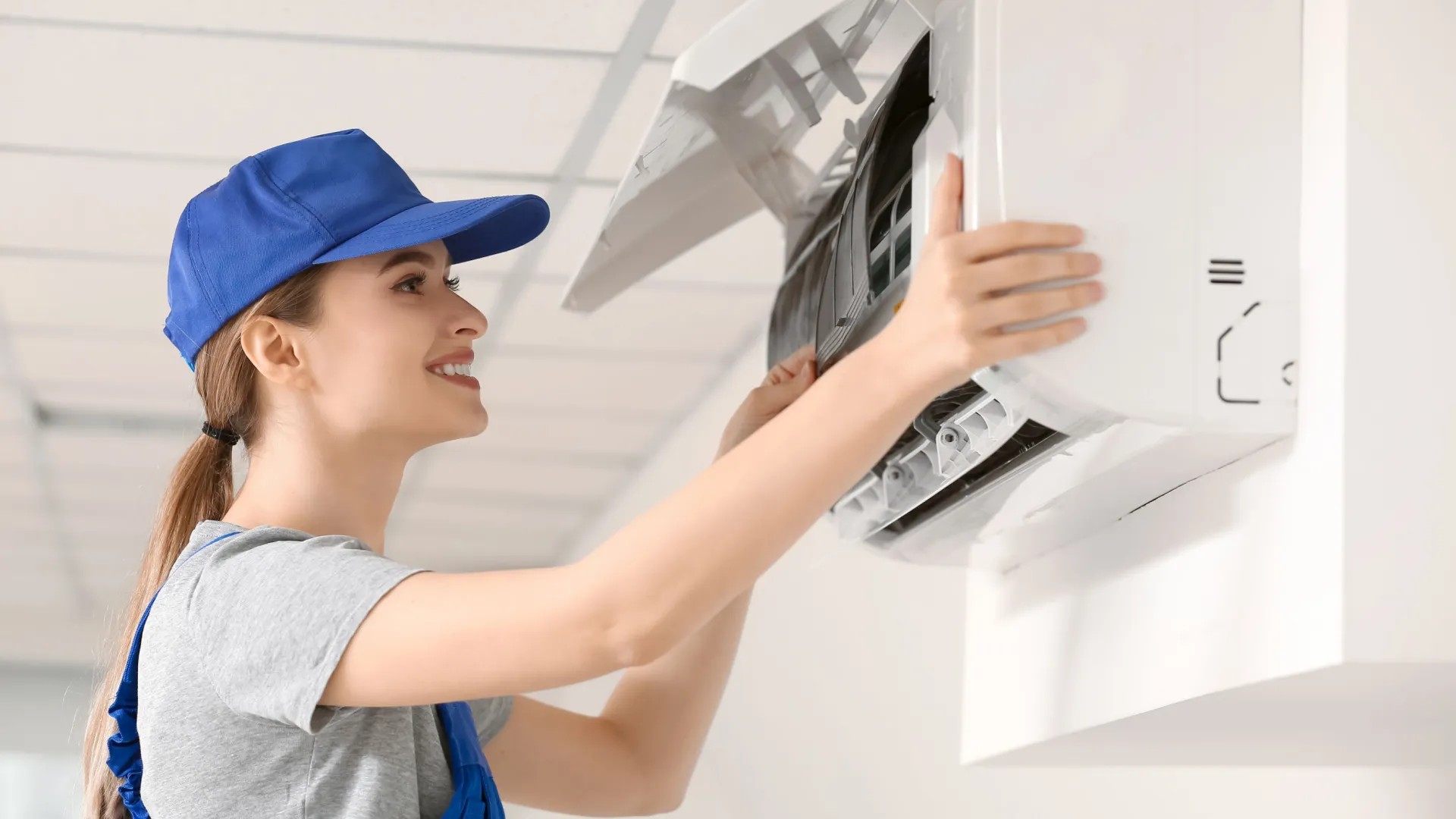Why is Seasonal AC Maintenance Important?
Seasonal AC maintenance is crucial for several reasons. First and foremost, it helps ensure that your air conditioning system is running efficiently, providing maximum cooling and airflow. This not only helps keep your home comfortable during the hot summer months but also helps lower your energy bills. Regular maintenance also helps prolong the lifespan of your AC unit, reducing the likelihood of costly breakdowns or repairs. Additionally, seasonal maintenance can help identify potential issues early on, preventing them from becoming major problems down the line. Overall, investing in regular AC maintenance is essential for optimal performance and long-term cost savings.
Common Signs that AC Maintenance is Needed
1. Strange noises or smells from the AC
If you notice any unusual noises or odors coming from your air conditioning unit, it’s a clear indication that maintenance is needed. Strange grinding, squealing, or banging noises could indicate a loose or worn-out component, while musty or burning smells could be a sign of mold or electrical issues. These issues should be addressed promptly to prevent further damage and ensure optimal performance.
2. Inadequate cooling or airflow
If your AC is not cooling your home as effectively as it used to, or if you’re experiencing reduced airflow from the vents, it’s a sign that maintenance is required. This could be caused by dirty filters, clogged ducts, or a malfunctioning compressor. A professional AC technician that can also provide an adequate ac installation north las vegas can diagnose the issue and perform the necessary repairs or cleaning to restore proper cooling and airflow.
3. Increased energy bills
If you’ve noticed a sudden spike in your energy bills without a corresponding increase in usage, it could indicate that your AC unit is not running efficiently. Dirty filters, leaky ducts, or other mechanical issues can cause your AC to work harder, resulting in higher energy consumption. Regular maintenance can help address these issues and ensure that your AC is running at maximum efficiency, saving you money on your monthly bills.
4. Frequent breakdowns or repairs
If you find yourself calling for AC repairs more often than usual, it’s a sign that maintenance is overdue. Neglected maintenance can lead to wear and tear on the components, increasing the likelihood of breakdowns and costly repairs. By scheduling regular maintenance, you can identify and address minor issues before they escalate, helping prevent inconvenient breakdowns.
5. Leaking or pooling water around the AC unit
If you notice water leaking or pooling around your AC unit, it’s a sign that something is amiss. This could be due to a clogged condensate drain, a refrigerant leak, or a malfunctioning pump. These issues should be addressed promptly to prevent water damage and ensure the proper functioning of your AC system.
DIY AC Maintenance Tips
While some maintenance tasks are best left to professionals, there are a few DIY tips you can follow to keep your AC in good shape:
- Regularly clean or replace your air filters to ensure proper airflow and reduce strain on the system. This should be done every 1-3 months, depending on usage and filter type.
- Keep the outdoor unit clear of debris, such as leaves, grass, and branches, to prevent airflow obstruction.
- Check and clean the condensate drain line to prevent clogs. A mixture of bleach and water can be used to flush out any algae or mold build-up.
- Inspect the blower motor and fan blades for dirt or dust accumulation, and clean as necessary.
- Check the thermostat settings and replace the batteries if needed.
While these DIY tips can help maintain your AC system to some extent, it’s still recommended to schedule professional maintenance at least once a year for a thorough inspection and servicing.
Hiring a Professional for AC Maintenance
While some minor maintenance tasks can be performed by homeowners, it’s highly recommended to hire a professional AC technician for comprehensive maintenance. Here are some benefits of hiring a professional:
- Expertise and experience: AC technicians have the knowledge and skills to diagnose and address a wide range of issues, ensuring your system is in optimal condition.
- Thorough inspection: Professionals can perform a detailed inspection of your AC system, identifying any potential problems before they worsen. This can help prevent costly breakdowns and repairs.
- Efficient servicing: AC technicians have the necessary tools and equipment to clean and service your AC unit effectively, improving its performance and energy efficiency.
- Warranty protection: If your AC unit is still under warranty, regular professional maintenance is often a requirement to keep the warranty valid. Failure to follow manufacturer guidelines may void your warranty.
The Dangers of Neglecting AC Maintenance
Neglecting AC maintenance can have several negative consequences:
- Decreased efficiency: A neglected AC system will likely work harder to cool your home, resulting in increased energy consumption and higher utility bills.
- Reduced lifespan: Lack of maintenance can lead to premature wear and tear of components, shortening the lifespan of your AC unit and increasing the likelihood of major breakdowns.
- Poor indoor air quality: Dirty filters and ducts can result in poor indoor air quality, exacerbating respiratory issues and allergies.
- Increased repair costs: Small issues that are left unattended can escalate into major problems, requiring expensive repairs or even replacement of the entire system.
AC Maintenance Checklist for Spring
Spring is the ideal time to perform maintenance on your AC system to ensure it’s ready for the hot summer months. Here’s a checklist of tasks to complete:
- Clean or replace air filters
- Clean the evaporator and condenser coils
- Inspect and clean the condensate drain line
- Check thermostat settings and calibration
- Inspect and tighten electrical connections
- Lubricate moving parts as needed
- Check refrigerant levels and refill if necessary
- Inspect and clean outdoor unit
- Test the system to ensure proper cooling and airflow
AC Maintenance Checklist for Summer
During the summer months, it’s important to continue monitoring and maintaining your AC system. Here’s a checklist to follow:
- Regularly clean or replace air filters
- Monitor the system for any strange noises or smells
- Check for proper airflow from the vents
- Inspect and clean the outdoor unit regularly
- Keep the surrounding area clear of debris
- Monitor and adjust thermostat settings as needed
- Check for any signs of water leakage
- Consider installing a programmable thermostat for energy efficiency
- Keep blinds or curtains closed during the hottest parts of the day to minimize heat gain
AC Maintenance Checklist for Fall
As the weather starts to cool down, it’s important to prepare your AC system for the upcoming winter. Here’s a fall maintenance checklist:
- Clean or replace air filters
- Remove any debris from the outdoor unit
- Inspect and clean the indoor blower motor and fan
- Check for any duct leaks and seal them if necessary
- Inspect and clean the condensate drain line
- Check and adjust thermostat settings for optimal efficiency
- Schedule a professional inspection and servicing
AC Maintenance Checklist for Winter
Although your AC may not be in use during winter, it’s still important to perform some maintenance to ensure it remains in good condition. Here’s a winter maintenance checklist:
- Clean or replace air filters
- Inspect and clean the outdoor unit
- Keep the surrounding area clear of snow, ice, and debris
- Check for any signs of damage or wear on the AC components
- Consider covering the outdoor unit for added protection
- Schedule a professional maintenance appointment for a thorough inspection before the start of the next cooling season
FAQs about Seasonal AC Maintenance
1. How often should seasonal AC maintenance be performed?
Seasonal AC maintenance should be performed at least once a year. It’s best to schedule maintenance in the spring before the summer heat hits, as this allows any necessary repairs or adjustments to be made before the system is under heavy use.
2. What are the benefits of hiring a professional for AC maintenance?
Hiring a professional AC technician for maintenance offers several benefits, including:
- Expertise and experience in handling AC systems
- Thorough inspection and servicing
- Identification of potential issues before they worsen
- Improved system performance and energy efficiency
3. Can I perform AC maintenance myself or is it better to hire a professional?
While there are some maintenance tasks that homeowners can perform themselves, such as regularly cleaning or replacing air filters, it’s generally better to hire a professional for thorough maintenance. Professionals have the necessary expertise, tools, and experience to effectively service the entire AC system and ensure optimal performance.
4. What are some common problems that can be prevented with regular AC maintenance?
Regular AC maintenance can help prevent common problems such as:
- Dirty filters and coils, which can hinder airflow and reduce cooling efficiency
- Clogged condensate drain lines, which can cause water leakage and potential water damage
- Worn-out or loose electrical connections, which can pose fire hazards
- Refrigerant leaks, which can lead to inadequate cooling and increased energy consumption
- Malfunctioning fans or motors, which can result in poor airflow and reduced comfort
5. How much does seasonal AC maintenance typically cost?
The cost of seasonal AC maintenance can vary depending on factors such as the size of the system, location, and any additional repairs or services required. On average, homeowners can expect to pay between $75 to $200 for a professional AC maintenance visit. However, it’s important to note that the cost of maintenance is a worthwhile investment to ensure optimal performance, energy efficiency, and the longevity of your AC system.

